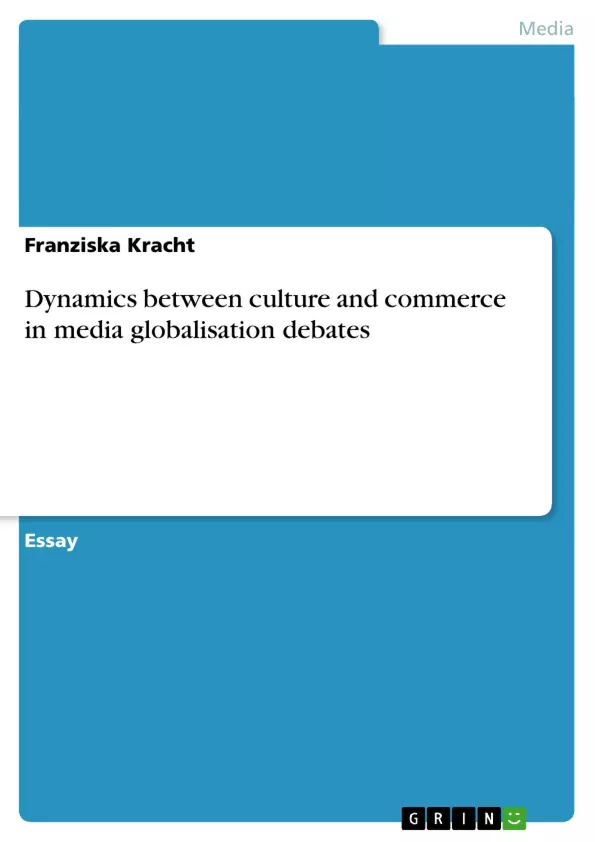Our final essay in the media and globalisation class dealt with the following question:
Critically discuss the dynamics between culture and commerce in media globalisation debates.
Use relevant examples to justify and elaborate your arguments.
I made use of an analysis of the current situation in the Australian film industry to examplify the issues of culture and commerce in the media discourse.
Inhaltsverzeichnis (Table of Contents)
- Introduction
- Media globalisation debates and the culture versus commerce arguments
- The contemporary Australian film industry
- National identity
- Effects of Australia's cultural policy on the film industry
Zielsetzung und Themenschwerpunkte (Objectives and Key Themes)
This essay critically examines the interplay between culture and commerce in media globalization debates, focusing on the Australian film industry as a case study. The essay aims to analyze the dynamics of this debate, explore the effects of cultural policies on the film industry, and ultimately question the limitations of a national identity-driven approach in a globalized media landscape.
- Media Globalization and the Culture vs. Commerce Debate
- The Impact of American Media on Local Cultures
- The Role of Cultural Policy in Shaping National Identity
- The Australian Film Industry: Balancing Culture and Commerce
- The Influence of Globalisation on National Cinema
Zusammenfassung der Kapitel (Chapter Summaries)
The first chapter introduces the topic of media globalization and its impact on local cultures, highlighting the prominence of the "culture vs. commerce" debate. The essay then focuses on the Australian film industry, using examples to demonstrate how the presence of American media can be perceived as a threat to local cultural identity.
The second chapter delves deeper into the culture vs. commerce debate, emphasizing the fear of Americanization and the perception of American media as solely commercial, driven by profit, while local content is often seen as a vehicle for cultural preservation and expression. The essay uses data on film budgets and box office success to highlight the significant power and influence of Hollywood in the global film market.
Chapter three focuses on the contemporary Australian film industry and its unique characteristics. The essay discusses the role of cultural policy in shaping the industry, emphasizing the Australian government's efforts to promote national identity through film financing and content regulation. The chapter highlights the emphasis on art house films over commercial genre films, demonstrating the government's preference for cultural over commercial value.
Chapter four examines the importance of national identity in the context of the Australian film industry. The essay explores how cultural policy plays a role in shaping and promoting a national identity, and the potential challenges and consequences of such a narrow approach. The chapter argues that the struggle to establish a national identity in a globalized media landscape is complex and multifaceted.
The final chapter examines the positive and negative effects of Australia's cultural policy on the film industry. The essay acknowledges the positive contributions of the policy, such as fostering a sense of national identity and supporting cultural content. However, it also discusses the limitations of a narrow policy, particularly in a globalized media environment where audience preferences and economic realities play a significant role.
Schlüsselwörter (Keywords)
This essay explores key concepts such as media globalization, cultural identity, national cinema, Americanization, and the culture vs. commerce debate. It analyzes the Australian film industry as a case study, examining the impact of cultural policy on the industry and the challenges of balancing national identity with the demands of a globalized media market. The essay highlights the complex interplay between culture, commerce, and national identity in a world where media consumption is increasingly globalized.
Frequently Asked Questions
What is the central debate between culture and commerce in media globalization?
The debate centers on whether media should be treated as a commercial product driven by profit or as a cultural vehicle for expression and national identity.
How does the Australian film industry exemplify this debate?
Australia struggles to balance the dominance of Hollywood (commerce) with government policies that fund local films to preserve national identity (culture).
What is 'Americanization' in the context of global media?
It refers to the perceived threat that American media dominance will erase local cultural differences and replace them with US-centric values and consumerism.
How do cultural policies affect film production in Australia?
Policies often favor "art house" films over commercial genres to promote a specific national image, which can limit the industry's economic competitiveness.
Can a national identity-driven approach survive in a globalized landscape?
The essay questions this, arguing that narrow national identity goals often clash with global audience preferences and the economic realities of the film market.
What are the economic impacts of Hollywood on local film markets?
Hollywood's massive budgets and global distribution networks often make it difficult for local productions to achieve similar box office success and financial viability.
- Arbeit zitieren
- Franziska Kracht (Autor:in), 2010, Dynamics between Culture and Commerce in Media Globalisation Debates, München, GRIN Verlag, https://www.grin.com/document/230452



